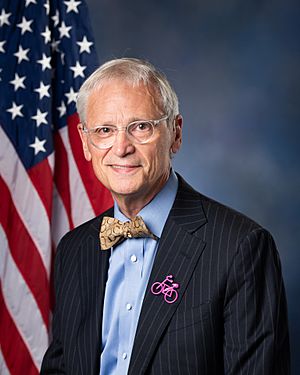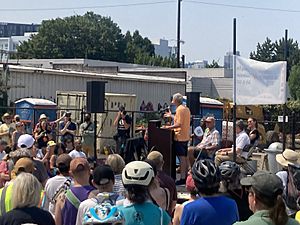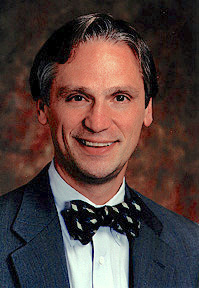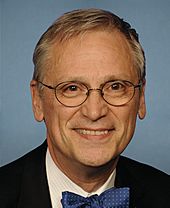Earl Blumenauer facts for kids
Quick facts for kids
Earl Blumenauer
|
|
|---|---|

Official portrait, 2019
|
|
| Member of the U.S. House of Representatives from Oregon's 3rd district |
|
| In office May 21, 1996 – January 3, 2025 |
|
| Preceded by | Ron Wyden |
| Succeeded by | Maxine Dexter |
| Portland City Commissioner | |
| In office January 5, 1987 – May 25, 1996 |
|
| Preceded by | Mildred Schwab |
| Succeeded by | Erik Sten |
| Member of the Multnomah County Board of County Commissioners | |
| In office January 1979 – January 1987 |
|
| Member of the Oregon House of Representatives from the 11th district |
|
| In office January 8, 1973 – January 1, 1979 |
|
| Preceded by | John W. Anunsen |
| Succeeded by | Rick Bauman |
| Personal details | |
| Born |
Earl Francis Blumenauer
August 16, 1948 Portland, Oregon, U.S. |
| Political party | Democratic |
| Spouse |
Margaret Kirkpatrick
(m. 2004) |
| Children | 2 |
| Education | Lewis and Clark College (BA, JD) |
Earl Francis Blumenauer (born August 16, 1948) is an American lawyer and politician. He served as a U.S. Representative for Oregon's 3rd district from 1996 to 2025. This district includes most of Portland east of the Willamette River.
As a member of the Democratic Party, Blumenauer spent over 20 years as a public official in Portland. He was on the Portland City Council from 1987 to 1996. He then took over from Ron Wyden in the U.S. House of Representatives. Wyden had been elected to the U.S. Senate after Bob Packwood resigned.
Blumenauer is known for his unique bow ties and bright bicycle pins. He often gives these bike pins as gifts to other members of Congress, interns, and staff. Since January 2025, Blumenauer has been a senior fellow at Portland State University. He also works as a special advisor to the university president, Ann Cudd.
Contents
Early Life and Education
Blumenauer was born in Portland on August 16, 1948. He finished high school at Centennial High School in Portland in 1966. After that, he went to Lewis & Clark College. He studied political science and earned a Bachelor of Arts degree in 1970.
He continued his education and received a law degree (Juris Doctor) from Lewis & Clark Law School in 1976. Before and during law school, from 1970 to 1977, he worked as an assistant to the president of Portland State University.
Early Political Career
In 1969–70, Blumenauer helped lead Oregon's "Go 19" campaign. This effort aimed to lower the state's voting age. Although it didn't succeed at first, it supported a national movement. This movement soon led to the Twenty-sixth Amendment to the United States Constitution, which lowered the voting age to 18 across the U.S.
In 1972, he was elected to the Oregon House of Representatives. He represented the 11th district in Multnomah County. He was reelected in 1974 and 1976, serving until 1979. From 1975 to 1981, he was on the board of Portland Community College. After his time in the state legislature, he served on the Multnomah County Commission from 1979 to 1986.
Blumenauer was elected to the Portland City Council in May 1986. He started his first term in January 1987 and stayed on the council until 1996. He was named the city's Commissioner of Public Works, which meant he was in charge of the Portland Bureau of Transportation. During his time on the council, Oregon Governor Neil Goldschmidt appointed him to the state's higher education commission, where he served in 1990 and 1991. In 1992, he ran for mayor of Portland but lost to Vera Katz. He left local politics to run for Congress. After winning his election to Congress, he resigned from the city council in May 1996.
Serving in the U.S. House of Representatives
Blumenauer was elected to the United States House of Representatives in 1996. This was a special election to fill the spot left by Ron Wyden, who had been elected to the U.S. Senate. Blumenauer won with 69% of the votes. He was then elected to a full term that November. He was reelected 10 more times without much trouble. His district has always been very supportive of the Democratic Party.
In Congress, Blumenauer is known for supporting public transportation. This includes Portland's MAX Light Rail and the Portland Streetcar. He also strongly supports laws that encourage bicycle commuting. He often rides his bike from his home in Washington D.C. to the Capitol and even to the White House for meetings.
Some of the laws Blumenauer helped create include the Bunning-Bereuter-Blumenauer Flood Insurance Reform Act of 2004. He also helped pass the Senator Paul Simon Water for the Poor Act of 2005. The Legal Timber Protection Act became law as part of the 2008 Farm Bill. The Bicycle Commuter Act also passed with the 2008 bailout bill.
Blumenauer worked to get the United States to do more during the Darfur conflict. He also spoke out about the dangers to New Orleans before Hurricane Katrina. He warned that the city was very vulnerable to floods.
Blumenauer supports the World Trade Organization. He voted for free trade agreements with countries like Peru, Australia, Singapore, and Chile. He also supported agreements with countries in Africa and the Caribbean. In 2004, he voted against the Central America Free Trade Agreement.
During the debate over health care reform, Blumenauer suggested an amendment. This amendment would have allowed Medicare to pay for counseling about end-of-life care. Some people misunderstood this idea. They claimed it would lead to "death panels" that would decide who received medical treatment. Blumenauer called these claims "mind-numbing" and an "all-time low."

On July 24, 2014, Blumenauer introduced a bill called the Emergency Afghan Allies Extension Act of 2014. This bill would have allowed 1,000 more Special Immigrant Visas for Afghan translators. These translators had helped U.S. troops during the War in Afghanistan. He argued that without these visas, the translators would be left in Afghanistan, still threatened by the Taliban.
Blumenauer did not attend any of President Trump's State of the Union addresses. He said he refused to be a "witness to his continued antics." In 2019, he was one of the first lawmakers to support the Green New Deal. In November 2020, Blumenauer was considered for Secretary of Transportation in the new Biden administration. However, Pete Buttigieg was chosen for the role.
According to an analysis by FiveThirtyEight, Blumenauer voted with President Joe Biden's position 99.1% of the time during the 117th Congress. He voted to provide support to Israel after the 2023 Hamas attack on Israel. On October 30, 2023, Blumenauer announced he would not run for reelection in 2024. On July 10, 2024, Blumenauer asked Joe Biden to withdraw from the 2024 United States presidential election.
Committee Assignments
- Committee on Ways and Means
- Subcommittee on Health
Caucus Memberships
Blumenauer was part of many groups in Congress, including:
- Congressional Progressive Caucus
- Renewable Energy and Energy Efficiency Caucus
- Sustainable Energy and Environment Coalition
- International Conservation Caucus
- Congressional Coalition on Adoption
- Congressional Bike Caucus
- Congressional Arts Caucus
- Climate Solutions Caucus
- U.S.-Japan Caucus
- Medicare for All Caucus
- Congressional Caucus for the Equal Rights Amendment
Post-Congress Life
On September 10, 2024, Portland State University announced that Blumenauer would join their faculty. He became a senior fellow and a special advisor to University President Ann Cudd. He also serves as a Presidential Fellow of the Institute of Portland Metropolitan Studies. Blumenauer started these roles on January 3, 2025.
Political Views
In 1996, Blumenauer voted for the Defense of Marriage Act. This law was later found to be against the Constitution in 2013 and was removed. Since then, he has supported LGBTQ rights.
On October 1, 2015, Blumenauer shared his plan to improve gun safety. He had published this report, titled Enough is Enough: A Comprehensive Plan to Improve Gun Safety, earlier that year.
Blumenauer has supported clean energy sources, health care reform, and continued federal funding for education.
Agriculture and Food
Blumenauer has long supported changes to farming and food systems. He often introduced laws to update U.S. farming policies. These laws would have limited government payments to large animal farms and livestock feed producers. They also would have increased support for smaller farms. His proposals aimed to add environmental and animal welfare rules for big animal farming operations.
Blumenauer supports more government funding for alternative proteins. This includes plant-based and cultivated meat. In April 2021, he led a letter from 20 members of Congress. They asked for $100 million to research and develop alternative proteins.
Animal Welfare
Blumenauer was a co-chair of the Congressional Animal Protection Caucus. He supports strong legal protections for animal welfare. In August 2023, he led a letter signed by over 150 representatives. They opposed adding language to the 2023 farm bill that would have stopped states from making their own rules about how animals are kept. This included rules against selling products from battery cages, gestation crates, and veal crates. Blumenauer's own farm bill idea would have created nationwide protections for farm animal welfare. It also would have removed government payments to intensive animal farming operations.
In February 2009, a pet chimpanzee in Connecticut badly hurt a woman. This event got national attention. Blumenauer then supported the Captive Primate Safety Act. This law would stop the sale or purchase of non-human primates for personal use between states and from other countries. He brought this law back up in 2024. In June 2008, Blumenauer had supported a law to ban trading great apes between states. This law passed the House but was not passed by the Senate.
Personal Life
Blumenauer has been married to Margaret Kirkpatrick since 2004.
He loves cycling and was the founder and co-chair of the Congressional Bike Caucus.
Every year, before Christmas, Blumenauer bakes and delivers hundreds of fruitcakes to his colleagues on the Hill.
See also
- Blumenauer Bridge
 | May Edward Chinn |
 | Rebecca Cole |
 | Alexa Canady |
 | Dorothy Lavinia Brown |



